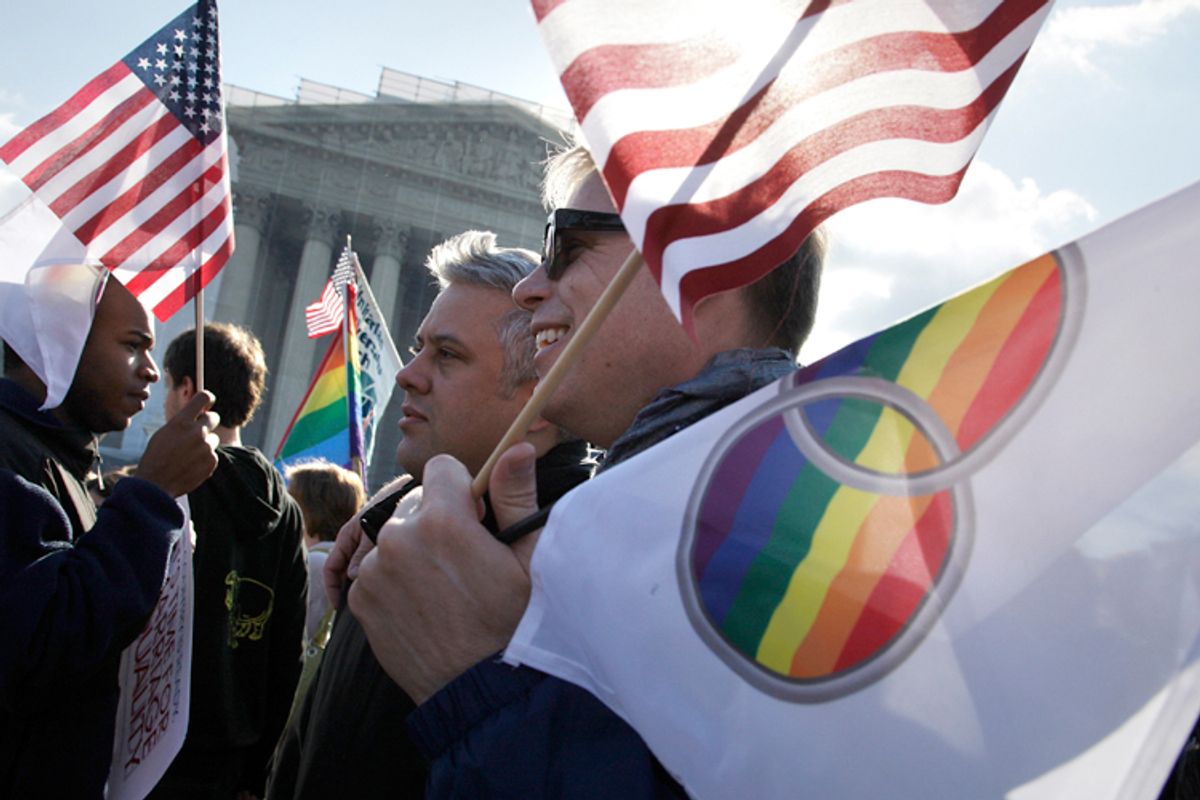Today, a group of lawmakers is trying to succeed where Congress has failed for almost two decades, by introducing a bill to finally end workplace discrimination against gay and transgender Americans. The Employment Non-Discrimination Act (ENDA) has been a top-ticket item for advocates since it was first introduced in 1994, but principle sponsor Sen. Jeff Merkley told Salon in an interview this afternoon that he thinks this will be the year they succeed.
"I think most Americans would be surprised to find out that it is legal to discriminate against the GLBT community, and to do so in employment, which is fundamental to the opportunity for the pursuit of happiness and for equality under the law and general fairness," the Oregon Democrat said in an interview.
Indeed, though it's almost hard to believe, with no federal statute on the books, it's perfectly legal to fire someone for being gay in 29 states that don't have their own non-discrimination laws. In 34 states, you can fire transgender people.
With the post-2012 election sea change on gay rights, Merkley says many of his colleagues "who were sitting on the fence are now taking a fresh look at the issue." The bill even has Republican support, with sponsorships from Sens. Mark Kirk of Illinois and Susan Collins of Maine in the Senate, and Florida Republican Rep. Ileana Ros-Lehtinen in the House.
"Think about this last presidential campaign. We have a president who took a stand in full support of marriage equality and won his election," Merkley said. He noted that when he entered the Senate just four year ago, he was one of only nine senators to endorse marriage equality -- now there are over 50.
Since then, a number of states have passed marriage equality laws, public opinion has moved sharply, and Congress has had important debates over related issues like expanding hate crimes legislation to protect LGBT people, and the repeal of "don't ask, don't tell."
In the Senate, the prospects look better than ever, thanks to the fact that Tom Harkin, the chairman of the Senate Health, Education, Labor and Pensions Committee -- another sponsor of the bill -- has promised to give the legislation its first committee markup since 2002 and get it to the Senate floor. From there, it will be up to Majority Leader Harry Reid to give it a vote, which seems likely. But the crux, as is often the case, will be the House.
"If we pass it with a bipartisan majority and we meet the 60-vote test in the Senate," Merkley said, "I think that if it comes up on the floor of the House it will be passed and be sent to the Oval Office. The key will be getting leadership to bring it up."
Nearly every Democrat would likely support ENDA in the House, where Colorado Democrat Jared Polis is the lead sponsor, but the bill would probably violate the so-called Hastert Rule, the unofficial protocol that the speaker should never bring a bill to the floor that a majority of his own caucus doesn't support. Still, John Boehner has broken that rule before and ENDA would be a prime contender to do it again. It would give Republican leaders the opportunity they've been looking for to reach out to gay Americans after the election, while stopping short of full marriage equality rights, and allowing social conservatives to cast protest votes against it.
But even if ENDA doesn't pass the House this year, succeeding in the Senate would still be a meaningful victory. It came within one vote of passing in 1996, but that was before filibusters made the 60-vote threshold the norm. There's a small chance the Supreme Court will make this whole argument moot if it lays down a very broad decision on the two same-sex marriage cases it's currently considering, but most court-watchers are expecting a narrower ruling.
"It seems like a long-gone era. I think the public is ahead of us, but I think -- I think -- Congress is ready to do some catching up," Merkley added.



Shares